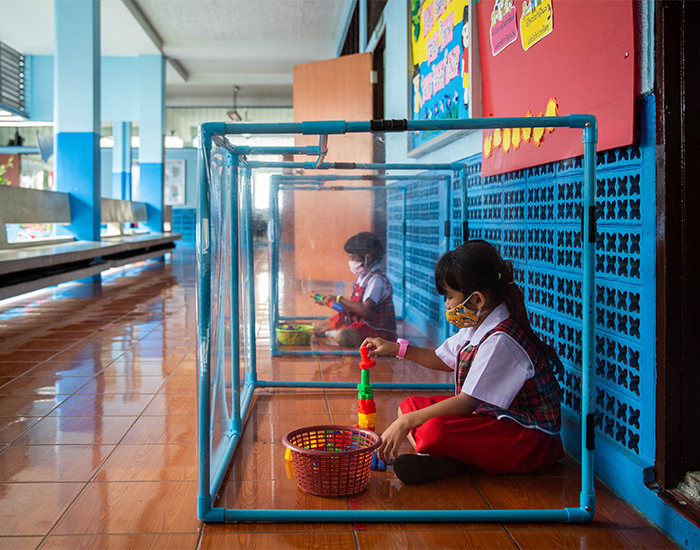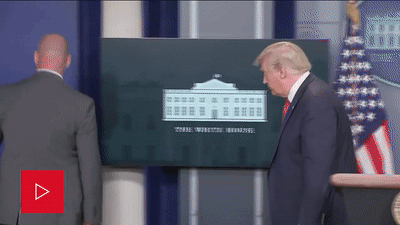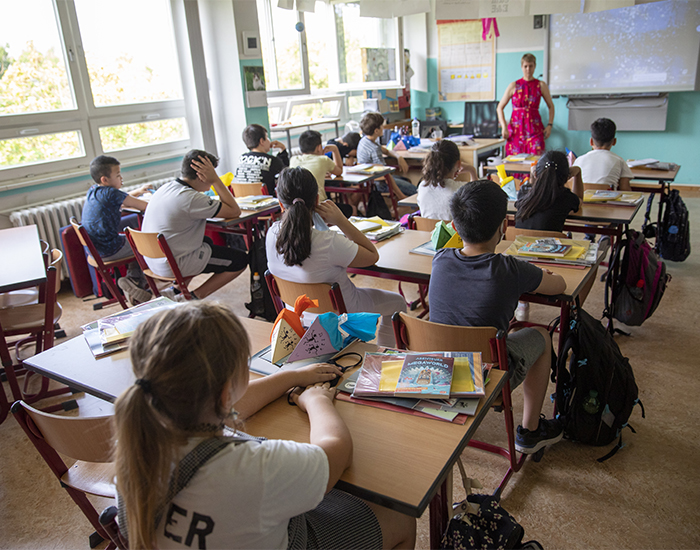| | |  | BY LAUREN GARDNER AND RENUKA RAYASAM | Presented by |  |
|
| With help from Myah Ward WORTHWHILE CANADIAN INITIATIVE — The U.S. recorded its 5 millionth confirmed Covid-19 case this weekend. More than 160,000 Americans have died from the disease. North of the border, things look drastically different: Over 120,000 cases and 9,000 deaths, according to the Johns Hopkins tracker. That puts the U.S. per capita case rate about five times higher than Canada’s. In March, Canada prohibited Americans from crossing the border for tourism or personal reasons. Business travel is generally allowed. In one recent poll, 85 percent of Canadians supported keeping the border closed for the rest of 2020. Canada hasn’t been completely immune from its version of a crowded Lake of the Ozarks party, like this well-attended drum circle in Vancouver last month, but unlike Americans, Canadians have succeeded in flattening their country’s epidemiological curve. Here are three theories that explain Canada’s pandemic success: It’s the coordination. Canada’s response has been similar to the U.S. strategy, in that provinces and territories have taken the lead on testing and contact tracing. But those levels of government were already traditionally responsible for administering health care in Canada, and their leaders now speak at least once a week by phone with Prime Minister Justin Trudeau. It’s the (less) partisanship. Canadians have benefitted from consistent messaging across the political spectrum. Sure, there’s been the occasional gripe from a provincial premier — and frequent complaints from Conservative members of Parliament — about how Trudeau’s Liberal government has managed one aspect or another of the pandemic response. But federal, provincial and territorial leaders have been unified in urging citizens to practice social distancing and proper hygiene. It’s Trudeau. The biggest difference between the Canadian and U.S. responses has been at the top. President Donald Trump has only recently begun to wear a mask in public — on occasion, and seemingly begrudgingly. Trudeau, who relishes being Trump’s foil, sought to model the behavior he preached in the early months of the pandemic. After his wife Sophie Grégoire Trudeau tested positive for the virus, the prime minister worked from his residence for weeks while giving daily press briefings — at a distance from reporters — as he urged Canadians to stay home. Trudeau’s highest-profile outing since the pandemic struck was to take a knee at a Black Lives Matter protest in Ottawa. He wore a mask. Welcome to POLITICO Nightly: Coronavirus Special Edition. Taking any tips in getting a 2-year-old to wear a mask. Reach out rrayasam@politico.com or on Twitter at @renurayasam.
| |
| | A message from PhRMA: America’s biopharmaceutical companies are sharing their knowledge and resources more than ever before to speed up the development of new medicines to fight COVID-19. They’re working with doctors and hospitals on over 1,100 clinical trials. Because science is how we get back to normal. More. | | | | | IT DIDN’T HAVE TO BE THIS WAY — The vast numbers of nursing-home deaths have been the greatest horror of the coronavirus crisis, yet the system operated by California’s Department of Veterans Affairs has been a rare bright spot, Maggie Severns writes. Across the country, at least 43,000 nursing home residents have died of coronavirus. In California, at least 3,400 have passed away. But at the eight CalVet veterans’ homes, only two have died of coronavirus. That’s among 2,000 residents, half of whom require round-the-clock care, including hospice patients and Korean and Vietnam war veterans with complicated health conditions. An average nursing home patient in California is 31 times more likely to die from coronavirus than a resident of a CalVet home. The diligence with which CalVet has fought coronavirus — a battle which leaders characterize more as trench warfare than a blitzkrieg — stands in sharp contrast to the failures of the many privately owned, loosely regulated homes that have seen residents die by the dozens. A POLITICO investigation involving interviews with California state officials and outside experts, along with a review of state documents and data, found that the key to their success was more effective management and planning. Starting as early as last December, CalVet leaders charted a consistent, unified response, based around the idea that one slip-up — be it an employee failing to wash his hands or an administrator failing to issue a test — could cost a resident his or her life. For example, while more than half of California’s 300 nursing homes received waivers exempting them from having the required level of staff in California, CalVet kept its homes fully staffed and hired extra professionals such as full-time doctors and nurses. Its facilities stockpiled masks, ensuring they wouldn't run short when the rest of the world did. In addition to the two residents who died, CalVet homes have seen six others get coronavirus and recover. All in all, CalVet’s experience suggests that the sweeping losses of elderly victims and people with disabilities across the country weren’t inevitable. A better system of care might have saved tens of thousands of lives.
| 
Thai kindergarteners wear face masks and play in screened-in areas used for social distancing at the Wat Khlong Toey School in Bangkok, Thailand. | Lauren DeCicca/Getty Images | | | HOW TO DISTRIBUTE A VACCINE — If a vaccine arrives, drug makers won’t be able to instantly produce enough doses for the country’s entire population (let alone the 8 billion doses needed to vaccinate the world), creating fraught questions about who should be at the top of the list — and who should be at the bottom. The Trump administration has asked the National Academies of Sciences to create a vaccine distribution framework, tentatively scheduled to be released in October, though the ultimate allocation would be up to federal, state and local governments. Health care reporter Rachel Roubein listened to the group’s public meeting Friday, where members discussed how to ethically distribute a vaccine. Rachel emails us: The group is in the early stages of figuring this out and right now they have more questions than answers. One of the questions facing the experts is whether the first goal of a mass vaccination strategy should be to minimize coronavirus cases or deaths. If the country wants to minimize deaths at the outset, the elderly should be one of the first in line. One of the biggest challenges with that response is that the elderly often have the weakest response to a vaccine. If the goal is to minimize cumulative incidence of the virus, then the question is more complicated — and may involve giving the vaccine to those transmitting the disease, like young adults. That would help create herd immunity more quickly in the general population and keep Covid from spreading to older adults. Another big hurdle: how to reach the minority communities disproportionately affected by the virus. Black adults, on average, harbor a deeper distrust of a potential coronavirus vaccine, which comes from decades of unethical experimentation. “Part of this work will be frankly head-on acknowledging some of the historical events that have led to the mistrust and that have led to some of the hesitancy,” said Ngozi Ezike, Illinois’ public health director. | |
| | POLITICO'S "FUTURE PULSE" - THE COLLISION OF HEALTH CARE AND TECHNOLOGY : There has been a surge of virtual health care visits due to Covid-19, but what is the future of telehealth beyond the pandemic? What does the struggle with Covid screening tests say about remote care? From Congress and the White House, to state legislatures and Silicon Valley, Future Pulse spotlights the politics, policies and technologies driving long-term change on the most personal issue for voters: Their health. SUBSCRIBE NOW. | | | | | | | DRAMATIC EXIT — As Trump was delivering his opening remarks to his daily press briefing, a Secret Service agent approached the president and told him to leave the briefing room. Trump unhurriedly followed the agent out, and the White House quickly shut down its live stream of the briefing. Just a few minutes later, Trump returned to the briefing room, saying there had been a shooting outside the White House. The Secret Service confirmed an officer was involved in a shooting at 17th St. and Pennsylvania Ave., only one block from the White House grounds.
| 
| Pointing fingers — Congressional negotiations over Covid relief have stalled, but the blame game is just getting started. Top congressional leaders and the White House lashed out at each other today, the latest sign that a bipartisan deal to boost the U.S. economy appears unlikely anytime soon, write Marianne LeVine and John Bresnahan. Trump claimed in a tweet that House Speaker Nancy Pelosi (D-Calif.) and Senate Minority Leader Chuck Schumer (D-N.Y.) “want to meet to make a deal” on a relief bill, but aides to the two top Democrats said no one from the White House had reached out to them since negotiations fell apart over the weekend. Senate Majority Leader Mitch McConnell (R-Ky.), meanwhile, accused Pelosi and Schumer of using the economic hardships being felt by tens of millions of Americans to pressure Trump and Senate Republicans into a deal. Schumer said the White House and top Senate Republicans were the ones who refused to compromise, leading to inaction on critical issues including testing, education funding and additional stimulus payments.
| |
| |  
| | | | |
16 The number of days it took the U.S to reach 5 million confirmed Covid cases from 4 million cases, according Johns Hopkins University. The country hit 5 million Covid infections on Aug. 8. |
| | 
Children sit for the first day of classes of the new school year today in Berlin, Germany. | Maja Hitij/Getty Images | | |
| | BECOME A CHINA WATCHER: Mounting concerns over foreign interference are casting a shadow on the U.S. election this fall. Are concerns that Beijing might seek to influence the results valid? Join the conversation and gain expert insight from informed and influential voices in government, business, law, tech and academia. China Watcher is as much a platform as it is a newsletter. Subscribe today. | | | | | | | ‘PLAY COLLEGE FOOTBALL’ — The Big Ten football conference is expected to cancel its college football season, and Trump had a straightforward response : “Play College Football!” Republican Sens. Ben Sasse of Nebraska, Marco Rubio of Florida and Kelly Loeffler of Georgia, along with Rep. Jim Jordan (R-Ohio), are also pressing for the show to go on, as a growing number of conferences, schools and two of the NCAA’s three divisions have already upended their seasons or canceled competitions. A lot of money, and potentially even votes, are at stake. Nightly’s Myah Ward talked with education reporter Juan Perez Jr. about whether Congress can save football, and why Republicans are weighing in. This conversation has been edited. Is college football going to get cancelled this week? No decisions have been officially announced by these big-time athletic conferences, but that’s not stopping coaches and players from speaking out about their concerns. An enormous amount of money — not to mention the lives of some dedicated players — hangs in the balance. Why are Trump and the Republicans getting involved, and is there anything they can do about it? Fans, business owners and schools are frustrated and worried about the implications of idle fall Saturdays. D.C.-based politicians can add pressure to the debate, and local authorities can set out legal standards or set the tone for a school’s decision, but they’re not the final decision-makers. College presidents, chancellors and athletics officials will be responsible for making the call to play or not.
| |
| | A message from PhRMA: America’s biopharmaceutical companies are sharing their knowledge and resources more than ever before to speed up the development of new medicines to fight COVID-19. They’re working with doctors and hospitals on over 1,100 clinical trials.
And there’s no slowing down. America’s biopharmaceutical companies will continue working day and night until they beat coronavirus. Because science is how we get back to normal.
See how biopharmaceutical companies are working together to get people what they need during this pandemic. | | | Did someone forward this email to you? Sign up here. | |
|
| | Follow us on Twitter | | | FOLLOW US
|
| |

No comments:
Post a Comment
Note: Only a member of this blog may post a comment.